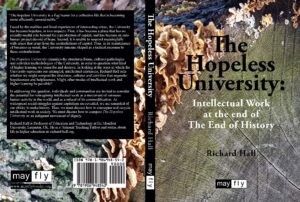I’m pleased to be contributing to a Decolonising Critical Thought Workshop on 5 May. My position statement is given below.
Through my own practice as research and evaluation lead for the Decolonising De Montfort University (DDMU) project, I am drawn to your question on: What are the risks of institutionalisation, co-optation, etc. and how can they be avoided?, and a related question: what is the purpose of the University in an age of intersecting crises?
DDMU attempts to make sense of EDI work (e.g. Race Equality Charter), in terms of more radical movements. This brings the University into relation with individual and communal issues of whiteness, double and false consciousness, and behavioural code switching. Inside formal structures, built upon cultures and practices with historical and material legitimacy, engaging with such issues is challenging. The tendency is for formal accreditation, managed through established methodologies, risk management practices and data reporting.
I am interested in how we might open-out discussions that situate the communal articulation of the institution against the development of authentic relationships as a movement of dignity. This connects to post- and anti-colonialism, making visible subaltern or subordinate identities, black power and indigeneity, and critical race or anti-racist studies, alongside critiques of education, including critical university studies and the abolition of the University. At the intersection of critical for and decolonising, I am interested in thinking through whether another University is possible, or even desirable.
In other news, I have a co-authored paper forthcoming in a special issue of Teaching in Higher Education, on Possibilities and complexities of decolonising higher education: critical perspectives on praxis. Our paper is a critical analysis of the work of DDMU, in relation to the structures, cultures and practices of universities. The abstract and structure are given below.
Hall, R., Ansley, L., Connolly, P., Loonat, S., Patel, K., and Whitham, B. (2021). Struggling for the anti-racist university: learning from an institution-wide response to curriculum decolonisation. Teaching in Higher Education, Special Issue, Possibilities and complexities of decolonising higher education: critical perspectives on praxis. DOI: 10.1080/13562517.2021.1911987 and https://dora.dmu.ac.uk/handle/2086/20773
Abstract: Increasingly, institutions are amplifying work on race equality, in order to engage with movements for Black lives and decolonising. This brings universities into relations with individual and communal issues of whiteness, white fragility and privilege, double and false consciousness, and behavioural code switching. Inside formal structures, built upon cultures and practices that have historical and material legitimacy, engaging with such issues is challenging. The tendency is to engage in formal accreditation, managed through engagement with established methodologies, risk management practices and data reporting. However, this article argues that the dominant articulation of the institution, which has its own inertia, which reinforces whiteness and dissipates radical energy, needs to be re-addressed in projects of decolonising. This situates the communal work of the institution against the development of authentic relationships as a movement of dignity.
Keywords: Black Lives Matter; critical race; decolonising; institutional change; whiteness; university
Structure: Introduction: an intersecting critique; Decolonising DMU: a critique of the University; Cultures of whiteness; Structures of dissipation; Practices of inertia; Decolonising the idea and practice of the University.
With Raj Gill and Sol Gamsu, I am working on A paper for a special issue of higher education, entitled Higher Education in the Eye of the COVID-19 Storm. Our paper has the working title:
‘Whiteness is a moral choice’: The idea of the University at the intersection of crises.
The proposed abstract is below.
Since the acceleration of a commodified higher education environment in England under the Coalition and successive Conservative governments, funding, regulation and governance of universities has become a contested terrain. Such contestation reveals a rupture in the very idea of the University, which makes clear the contingencies underpinning both the student-as-consumer in a deregulated market, and a renewed, fetishized, public university. These symbolic ideas of the institution have been cracked by the everyday realities of a confluence of crises.
Beyond existential crises like climate forcing, specific ruptures have led to a fundamental questioning of social institutions, cultures and practices. In particular, the conjuncture of Covid-19 pandemic and Black Lives Matters have exposed the limitations of dominant and alternative imaginaries of higher education, which tend to be framed by whiteness. At a time when university workers were already engaged in industrial action over #fourfights, this conjuncture highlighted deep, intersectional injustices at the centre of these institutions, in spite of institutional engagement with standardised forms of accreditation, like Athena Swan and the Race Equality Charter. Struggles against structural inequalities erupted at the intersection of: first, differential workload, casualisation and pay; second, the marginalisation of black communities and communities of colour, in social outcomes through Covid-19; and third, the ongoing brutalisation of black communities and communities of colour, when they address state institutions.
Working through documentary and policy analyses, this paper articulates the ways in which these injustices are imminent to the idea of the University. This questions how this allegedly liberal institution is reproduced through whiteness as a site of othering. As a process of separation, divorce, alienation and estrangement between people, othering pivots around whiteness as a moral choice. As a result, this paper describes how the idea of the University has been explicitly revealed through this conjuncture as a means of distorting the subjectivities of all those who labour inside it, for inhuman ends. In critiquing, for instance, the Department for Education’s recent Restructuring Regime, this argument highlights the ideological positioning of economic value, productivity and surplus as mirrors that make certain bodies, cultures and practices visible and reinforces structural inequalities. Yet, in an age of crisis, this ideological positioning is in conflict with new social movements pushing to break the mirrors of whiteness and look for alternative pathways. Here, we question whether the University is able to move beyond the reproduction of structural inequality, in order to contribute to the abolition of the present state of things?
